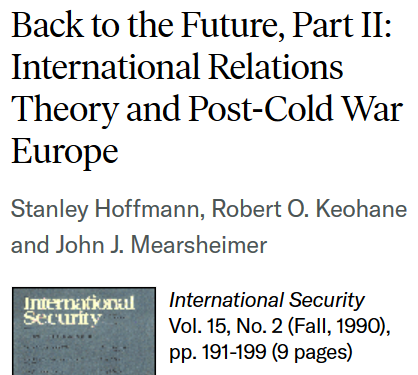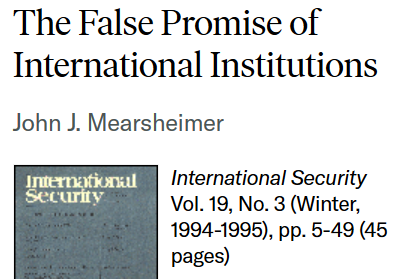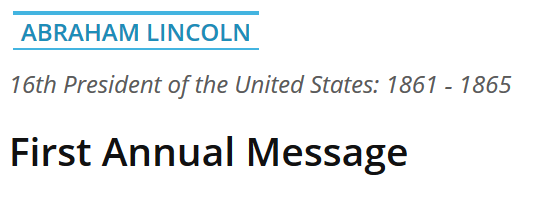
Has International Relations had ANY actual "Great Debates"?
Absolutely! In the 1990s, JJ Mearsheimer and Bob Keohane debated in the pages of @Journal_IS.
Here's what happened. Time to #KeepRealismReal
[THREAD]

Absolutely! In the 1990s, JJ Mearsheimer and Bob Keohane debated in the pages of @Journal_IS.
Here's what happened. Time to #KeepRealismReal
[THREAD]


As I shared in a previous #KeepRealismReal thread, Mearsheimer published a piece in 1990 in @Journal_IS titled "Back to the Future" predicting a dismal future in Europe
https://twitter.com/ProfPaulPoast/status/1412739908565884928
In that piece, Mearsheimer examined what could happen if the Cold War's end led to a US withdrawal from Europe and a subsequent collapse of @NATO 

Almost immediately, several scholars took issue with Mearsheimer's piece.
Indeed, the responses led @Journal_IS to publish TWO sequels: Back to the Future Part II...
Link: jstor.org/stable/2538869…
Indeed, the responses led @Journal_IS to publish TWO sequels: Back to the Future Part II...
Link: jstor.org/stable/2538869…

The critiques were basically:
- Hoffmann: learn more about the European Community
- Russett: learn more about the evidence favoring the democratic peace
- Risse-Kappen: learn more about the Helsinki Process
- Keohane: think more about what international institutions do.
- Hoffmann: learn more about the European Community
- Russett: learn more about the evidence favoring the democratic peace
- Risse-Kappen: learn more about the Helsinki Process
- Keohane: think more about what international institutions do.
Let's elaborate a bit on Keohane's criticism, as it really goes to the heart of Mearsheimer's piece.
Keohane actually accepts a key part of Mearsheimer's argument for why the Cold War was largely peaceful in Europe: bipolarity (i.e. the continent was dominated by TWO major powers, US v USSR) 

However, Keohane, unlike Mearsheimer, thinks international institutions -- such as the European Community & @NATO -- played a critical role even in this environment 

Keohane argues that international institutions helped make behavior predictable, because following the rules of institutions signaled a willingness to continue a pattern of cooperation. 

Keohane's main point is stated in the next paragraph -- continued peace in Europe is conditional on retaining and transforming such institutions, such as @NATO. 

That's an interesting comment by Keohane, because Mearsheimer raised a similar point in footnote 1 of his article 

Where they differ is on the specific role of @NATO:
-- Keohane: institutions like NATO or the European Community matter for creating a stable post-Cold War European Order.
-- JJM: @NATO only matters if it is a vehicle for the US to continue to militarily dominate the continent
-- Keohane: institutions like NATO or the European Community matter for creating a stable post-Cold War European Order.
-- JJM: @NATO only matters if it is a vehicle for the US to continue to militarily dominate the continent
This is the crux of their "Great Debate": do international institutions matter IN AND OF THEMSELVES or only as a reflection of the distribution of power? 🤔
Mearsheimer wrote a response to Keohane.
In the response, He accurately identifies Keohane's main point: institutions matter more than Mearsheimer recognizes
In the response, He accurately identifies Keohane's main point: institutions matter more than Mearsheimer recognizes

The problem with Mearsheimer's response is that, for whatever reason, he decided to focus on Keohane's After Hegemony.
amazon.com/After-Hegemony…
amazon.com/After-Hegemony…
Look, there are valid criticisims of Keohane's book.
But by going after it, Mearsheimer never circles back to the fact that Keohane, like him, brought up the necessity of continuing NATO.
So Mearsheimer didn't really address Keohane's critique of his piece 🤷♂️
But by going after it, Mearsheimer never circles back to the fact that Keohane, like him, brought up the necessity of continuing NATO.
So Mearsheimer didn't really address Keohane's critique of his piece 🤷♂️
But Mearsheimer wouldn't leave the issue unaddressed for long. He directly took it on in his 1995 @Journal_IS piece, "False Promise of International Institutions"
Link: jstor.org/stable/2539078…
Link: jstor.org/stable/2539078…

At the time of the writing, NATO had not yet expanded Eastward beyond Germany. There were still doubts it would do so, though the possibility remained 

Mearsheimer's main point, and the most quoted line from the paper, is made upfront: institutions do not themselves influence states. 

This is because it's all about the international distribution of power: institutions are simply a reflection of this distribution 

He then uses NATO to illustrate his point (so Mearsheimer is now finally directly addressing Keohane's earlier criticisms) 

Back came Keohane with a response piece, this time bringing reinforcements: his then Harvard colleague Lisa Martin
Link: jstor.org/stable/2539214…
Link: jstor.org/stable/2539214…

They raise several arguments, such as...
...Why would states bother building institutions if they don't matter?
...Of course institutions reflect the distribution of power (who else is going to build these things)!
...Institutions do not only cover economic affairs
...Why would states bother building institutions if they don't matter?
...Of course institutions reflect the distribution of power (who else is going to build these things)!
...Institutions do not only cover economic affairs
On this last point, Keohane and Martin cite the work of John Duffield, such as his @IntOrgJournal piece
cambridge.org/core/journals/…
cambridge.org/core/journals/…
My view is it would have been good if Keohane and Martin had themselves unpacked the role played by NATO (not just cite the Duffield piece) given how central it, and security in general, is to JJM's claims.
Indeed, this comes up in Mearsheimer's response to Keohane and Martin.
Link: jstor.org/stable/2539218…
Link: jstor.org/stable/2539218…

In fact, Mearsheimer doesn't see anything in the Keohane and Martin response that seems to go against his claims
- Yes, institutions can be useful tools for major powers
- Agree that institutions reflect the distribution of power
- There are indeed security institutions
- Yes, institutions can be useful tools for major powers
- Agree that institutions reflect the distribution of power
- There are indeed security institutions
What to conclude from this "Great Debate"?
First, the debate has continued to generate conversation.
For example, see this entertaining summary video created by students at @UNSW ...
For example, see this entertaining summary video created by students at @UNSW ...
Second, despite the conversation it generated, I have a strong sense that the sides, while debating, were talking past one another:
- Mearsheimer sidestepped Keohane's criticisms in Round 1
- Keohane and Martin sidestepped Mearsheimer's criticism in Round 2.
- Mearsheimer sidestepped Keohane's criticisms in Round 1
- Keohane and Martin sidestepped Mearsheimer's criticism in Round 2.
Third, I think students can gain more from reading the classic Downs, Rocke, and Barsoom @IntOrgJournal piece.
cambridge.org/core/journals/…
cambridge.org/core/journals/…
They argue that compliance w/ international law & within international institutions is high because states only sign laws that they want to follow.
BOTH Mearsheimer and Keohane can agree on that point!
BOTH Mearsheimer and Keohane can agree on that point!
So there you have it: the "GREAT" Mearsheimer-Keohane debate. What did we learn? Institutions matter...sometimes...except when they don't...maybe.
[END]
[END]
• • •
Missing some Tweet in this thread? You can try to
force a refresh


















